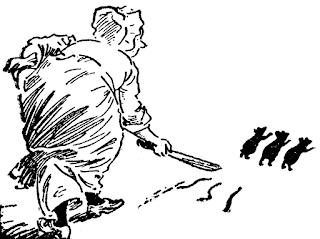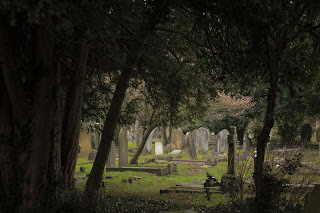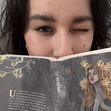Alexandra García Galván's Blog, page 3
June 4, 2020
Book Review: Writers and Lovers by Lily King


This is the story of Casey Peabody, a 31-year-old woman who has lost her mother and has been through a breakup recently. Casey has been writing a book for six years and has been trying to finish it while she breathlessly works as a waitress.
As the story unfolds, we can see how she has to deal with her lifelong friends that are getting married and start to have the lives they're supposed to have because of their age. King accurately describes that being over 30 doesn't mean your life's solved but actually starting; the character struggles mentally, financially, and romantically.
The first half of the book was really slow-paced for me compared to the second half, which is important somehow since you can feel the anxiety and hopelessness Casey has. Throughout the book, we can see more characters, like Oscar, Silas, Muriel, Harry, Caleb, and Adam but none of them has enough development. I still celebrate Muriel, Harry, and Casey's friendship, though, but I disliked completely one of her romantic relationships completely; I never liked the way he always referred or talked to her at all. Also, I felt as forced as she felt it.
Writers & Lovers isn't for everyone, maybe that's why I felt I wouldn't finish it. What totally makes it up are the parts about writing. King completely nailed it, at least when it comes to amateur writers like me, I don't know about the rest. She talks about the fears and expectations that come with it with the right words, and I know that more than one will feel identified with those quotes.
I could read this book thanks to NetGalley ;)
 LILY KING grew up in Massachusetts and received her B.A. in English Literature from University of North Carolina at Chapel Hill, and her M.A. in Creative Writing from Syracuse University. She has taught English and Creative Writing at several universities and high schools in this country and abroad. Lily's new novel, Euphoria, was released in June 2014. It has drawn significant acclaim so far, being named an Amazon Book of the Month, on the Indie Next List, and hitting numerous summer reading lists from The Boston Globe to O Magazine and USA Today. Reviewed on the cover of The New York Times Book Review, Emily Eakin called Euphoria, “a taut, witty, fiercely intelligent tale of competing egos and desires in a landscape of exotic menace.”
LILY KING grew up in Massachusetts and received her B.A. in English Literature from University of North Carolina at Chapel Hill, and her M.A. in Creative Writing from Syracuse University. She has taught English and Creative Writing at several universities and high schools in this country and abroad. Lily's new novel, Euphoria, was released in June 2014. It has drawn significant acclaim so far, being named an Amazon Book of the Month, on the Indie Next List, and hitting numerous summer reading lists from The Boston Globe to O Magazine and USA Today. Reviewed on the cover of The New York Times Book Review, Emily Eakin called Euphoria, “a taut, witty, fiercely intelligent tale of competing egos and desires in a landscape of exotic menace.”May 31, 2020
Reseña de libro: Apología de la brevedad de Elizabeth Villa

Apología: f. Discurso de la palabra o por escrito, en defensa o alabanza de alguien o algo.
Elizabeth Villa recurrió a la minificción para mostrar aquellos detalles que están presentes en nuestra vida diaria.
Si bien hay un par de textos que pudieron estar más cortos, la apología se hace presente con una voz que termina siendo muy característica en la autora, lo cual es difícil de lograr en los textos de este género.
Mi favorito fue "Tarde", definitivamente.
 ELIZABETH VILLA es licenciada en Lengua y Literatura de Hispanoamérica por la Universidad Autónoma de Baja California y Maestra en Literatura Mexicana por la Benemérita Universidad Autónoma de Puebla. En el 2007 recibió una mención honorífica en la categoría de cuento con Diez minificciones sin moral ni moraleja en el Premio Filosofía y Letras convocado por la BUAP.
ELIZABETH VILLA es licenciada en Lengua y Literatura de Hispanoamérica por la Universidad Autónoma de Baja California y Maestra en Literatura Mexicana por la Benemérita Universidad Autónoma de Puebla. En el 2007 recibió una mención honorífica en la categoría de cuento con Diez minificciones sin moral ni moraleja en el Premio Filosofía y Letras convocado por la BUAP.May 28, 2020
Alexandra, The Dorky Writer: Chapter 9

A terrible curse had fallen in the kingdom where Alexandra, The Dorky Writer, lived. Everyone had to stay home, otherwise, people could fall ill and even die. Even though The Dorky Writer loved to stay away from adventures, she started to feel anxious because her look-alike angels started to look more like little devils who didn't know what to do with their lives while being trapped. Days passed and she received an owl-delivered letter. It was a tiny ad from her Dragon friend. A mean to escape while staying home. A new kind of adventure. She sent her answer. And that's how it began.
My beloved friend/Facebook daughter, Priscila Dragón, decided to open a writing workshop during this quarantine and invited people from everywhere. I actually didn't think about it twice and asked her if I could participate. I got in. This is one of the best decisions I've ever made.
I admit it, logging in every Tuesday and Thursday still gives me the bad chills, part of the anxiety, I suppose, but things flow in a way that is so natural, that, little by little, such anxiety goes away... until our next session, ha, or until I have to read what I wrote, of course. When sharing out loud I'm always feeling as if I'm going to be attacked somehow, and this is where it becomes magical. There are not attacks, not bad intentions. The LETRASIS group is well-intentioned, their criticism is incredibly constructive, our (I'm including myself here this time) reactions are pure and priceless. And the support! The encouragement is neverending!
I've felt braver when it comes to sharing. I've published one of the things I've enjoyed the most in here, as Sin pólvora, pero con tinta, and I also have a queue already for the other projects.
Catharsis has been humongous, both when it comes to writing and still recent heartbreak. And, I haven't told this to them but LETRASIS is one of the things that are helping me coming back to the writing world for real, to the point I'm going to share my unfinished novel(s) for the first time (I'm dying inside a little, stupid anxiety), and thanks to them and Anny's advice, I even decided to go back to my Master's Degree classes (I feel I'm not going to finish all homework because my mind is in a bad learning state, but the point is that I'm back, bitches!)
This is where I fear I am in a maniac mood, the top of the rollercoaster, because my brain is in such fire I've been trying to to do everything at the same time: the reading, the writing, everything related to the world I'm familiar and that I love since forever. So I really hope it's not! I'm beginning to use my bullet journal properly!
I've had some trouble with the Master's, but talking about LETRASIS, my writing family, makes me not want to talk about that now.
Thank you Priscila, 313, Missael, Karla, and Juan Carlos!
End of Chapter 9.
May 24, 2020
Book Review: The Mousetrap by Agatha Christie


Three blind mice. Three blind mice.See how they run. See how they run.They all ran after the farmer's wife,Who cut their tails with a carving knife,Did you ever see such a sight in your lifeAs three blind mice?
The Mousetrap is a book that was assigned as homework. I wasn't expecting it to be a play and, unfortunately, I am not a fan of reading them.
This is my first Agatha Christie's book and I consider this is a light start for me.
Monkswell Manor seems to be a wealthy infrastructure, but their old and worn furniture reveals its antique; the manor is clean, though, since a couple opens it as a new boarding house after receiving the building as an inheritance. Little did they know, their guests would be indeed peculiar: there's a character that looks like has problems while interacting with people, another that feels like an expert about the new business, and even another that comes from everywhere but belongs to nowhere.
During the guests' arrival, it is heard on the radio that a murderer is on the loose. The next day, after receiving a telephone call from the police, everyone in the manor becomes a suspect of two new future victims, an occurrence based on an eerie song, The Three Blind Mice.
The development of the characters brings with them the clues and possible reasons why they could be the assassins since they have a curious familiarity with a case that involves three orphans (the mice) several years ago. No one knows each other enough to know who is guilty, so everyone must stay vigilant.
I think the story disappointed me because I knew who was the guilty one almost since the introduction of the character, I paid much more attention to details than usual because it was homework, boohoo! I mean, even the way they talk to each other revealed a little too much.
Even though the process of the story is very good, I was actually very engaged with the reading, the ending comes very fast, abrupt, giving you little time, not to comprehend, but not enough to believe why things come to be the way they are. It is as if there was no real closure. Maybe this needs to be seen or even being made as a novel, so it can have more background.
 AGATHA CHRISTIE was an English writer known for her sixty-six detective novels and fourteen short story collections, particularly those revolving around fictional detectives Hercule Poirot and Miss Marple. She also wrote the world's longest-running play The Mousetrap, as well as six novels under the pseudonym Mary Westmacott. In 1971, she was appointed a Dame Commander of the Order of the British Empire for her contribution to literature.
AGATHA CHRISTIE was an English writer known for her sixty-six detective novels and fourteen short story collections, particularly those revolving around fictional detectives Hercule Poirot and Miss Marple. She also wrote the world's longest-running play The Mousetrap, as well as six novels under the pseudonym Mary Westmacott. In 1971, she was appointed a Dame Commander of the Order of the British Empire for her contribution to literature.
May 22, 2020
Alexandra, The Dorky Writer - Chapter 8

Alexandra, The Dorky Writer hadn't been able to move for months. For almost a couple of years. She hadn't fallen into a sleeping course, but that would've been so much better. She had lost herself in every way possible. Her handsome wizard boyfriend had left her with no true explanation, she had given up the encounter against the Mighty Thesis; she hurt herself in that thorny forest, she drank her feelings and then let them out to have something to drink again. Her environment was consuming her.
She didn't understand how, but three angel-like people found her right on time. They took her to a healer, where she liked to keep flowers of all kinds: some wittered, some fully bloomed, but all of them well taken care of. The path to recovery was tricky. Even though new tools were given to her to recover her way again, she kept going back to the forest to see if she could die, if she could recover what she once thought was hers, feeling unworthy and unwanted even though those four helpers always told her she was indeed worthy, someone worth fighting for. She couldn't comprehend. The language they spoke became unnatural and there was no interpreter. There was no other remedy but to give her strength and courage potions. These made her feel sick of herself even more, not because of their effectiveness but because they made her see herself and made her ask herself how she had fallen so down.
So, yeah. My boyfriend, now ex, broke up with me with arguments that, with the passing of the months, seem weaker and weaker. Seems to me he wanted to get rid of me from a long time ago but didn't know how. I'll just say he did it in one of the most cowardly ways possible, the moment I needed him the most. But I don't want to talk about him here, I already have enough with a lot of unsent messages I have for him and all the times I have to talk about it with my therapist and psychiatrist.
I am being treated now for depression, generalized anxiety disorder, and, to make it more awesome, cyclothymia. I am under medication since December 2019, although the therapies started back in October. I was reluctant to take pills again, it felt like I was going back to a path I had already taken. Also, I didn't mind if I died at all. I wanted it... needed it. I had lost so much: John, my Master's Degree classes, my will.
I cannot say I feel like new now, I still feel so damn bad sometimes, as if I'm going back to the beginning but I'm actually different. The pain for everything is there, every day, not every minute of the day, though. BUT the biggest problem is there when the bad days come: I don't want to get better. This is not just make an effort, Ale, as everyone loves to say, this is about me not wanting to do it. Fortunately, if I can say it, just this month, my psychiatrist has finally found the right medication for me. That process has been so damn difficult! Apparently cyclothymia isn't as easy to identify as bipolar disorder.
Currently, my mind is right on the top of the roller coaster. I fear this might be a maniac phase. But that's an issue for another chapter.
End of Chapter 8
May 20, 2020
Reseña de libro: Las aventuras de Don Chipote o Cuando los pericos mamen de Daniel Venegas

Las aventuras de Don Chipote es una novela que narra la historia de Don Chipote y su familia en busca de una vida mejor después de creerse las mentiras del compadre Pitacio, quien acababa de regresar de Estados Unidos, que se las daba de gran conocedor y que supuestamente había amasado dinero y cultura por “aprender inglés”.
A lo largo de la trama, que describe todas las dificultades que el hombre tuvo que pasar junto con su perro Sufrelambre y el amigo que hace en las aventuras, Policarpo, muestra cómo hay una añoranza hacia la familia, mas no de la vida en México, en cómo fue un poco la época del enganche, los abusos tanto de mexicanos como de estadounidenses y cómo el viaje le da al personaje principal otra perspectiva al darse cuenta de que todo son mentiras, descubrir que se harían ricos hasta que los pericos mamen y de lo fácil que resulta mentirle a la sociedad respecto a lo mismo.Al leerlo, muestra que la situación para los mexicanos en Estados Unidos en cuestión de abuso, discriminación y oportunidades de empleo ha cambiado muy poco, con lo cual, Las aventuras de Don Chipote, publicada en 1928, desgraciadamente sigue siendo de lo más relevante.
La manera burlesca del libro hace que resulte ameno de leer. El escritor busca generar empatía, a pesar de que él mismo no la tiene, con el protagonista y sus desgracias, por lo que nos convierte en sus amigos y deja que el texto quede lleno de coloquialismos para que nos familiaricemos más, pero también lo deja con un lenguaje elevado y de uno que otro vocablo en inglés para marcar la diferencia entre una cultura y otra.
Si nos enfocamos en lo que significa “chicano” en la actualidad (“Dicho de una persona ciudadana de los Estados Unidos de América y perteneciente a la minoría de origen mexicano ahí existente”), entonces Las aventuras de Don Chipote no es parte de la literatura chicana.
Hay que recordar que la palabra “chicano” fue utilizada en el texto para hacer mención de las personas mexicanas en Estados Unidos, no para personas nacidas de padres mexicanos, por lo que nos encontramos con un cambio de significado como el que se vio en el texto de Juricek respecto al cambio de la palabra “frontera”.
El autor, Daniel Venegas, nació en México y tuvo la oportunidad de conocerlo, ya que emigró después; a diferencia de las personas nacidas en el otro lado, él tuvo la oportunidad de comparar los dos estilos de vida, mientras que los chicanos, por el contrario, escriben con el ferviente deseo de ser transportados a la tierra mítica que es México porque su vida ha estado en contacto con dos culturas al mismo tiempo y en verdad quieren saber a cuál pertenecen. Es así como descarto que Las aventuras de Don Chipote pertenezca a la literatura chicana. Don Chipote nace en México, viaja, compara, pero regresa al lugar que lo vio nacer. La añoranza es distinta.
No se puede decir que la novela es fronteriza. El protagonista sí cruza una frontera pero no hay un verdadero reflejo de esa vida a lo largo de la historia, es tan siquiera un pequeñísimo extracto; lo que vemos son las desgracias que siguieron al personaje, y al de su familia en ella al querer cruzarla. El switch coding está muy marcado, contrario a lo que se hace en las novelas chicanas más actuales, donde esos pequeños detalles marcan la diferencia con respecto a algo escrito por un autor mexicano.
May 15, 2020
La delicia de morir

¡No, no, no, no! ¡Pero qué delicia había sido morir! La finalidad de la existencia de la humanidad es precisa e irónicamente ésa: vivir para morir… pero ¡ah! Nada había sido tan placentero como su caso.
Él había nacido en 1985, aquel año en que la gente se volvió histérica por el SIDA, a tal grado que él fue el resultado del último acostón que tuvo la pobrecilla de su madre en su vida. Por eso el papá se fue con otra vieja y por eso la primera parte de su niñez estuvo de la chingada, llena de privaciones y disturbios emocionales. Pasaron unos nueve años y la mamá se cortó las venas simplemente por tener un hijo y después de tratar de hacerse cargo de él durante fuertes crisis financieras, así que terminó viviendo con su papá y su joven y guapa novia. Le decían La Guapa pero de eso no tenía nada.
A los años el papá se enfermó porque resultó que la cabrona de La Guapa andaba enferma del condenado virus o síndrome o como se llamara; la cosa es que los dos terminaron sidosos y muertos rápido y él acabó en la calle porque prefería eso al DIF. Anduvo mendigando por un par de años hasta que lo reclutaron en una banda que se metía a robar a las casas de los ricachones, porque por qué no entrar y robarles algunas cosas si ellos se las podían volver a comprar, pues.
Y así anduvo, entrando, agarrando cosas y saliendo ágilmente, por lo que lo apodaron El Conejo. Por primera vez tenía un grupo que no se burlaba por su delgadez, ahí él era la pieza clave de la operación. Pasaron unos meses y los miembros de la banda decidieron regalarle al Conejo una hora con la vieja de su preferencia, que porque ya tenía que dejar de ser un señorito. Él se negó en un principio por el pinchi SIDA y El Pato le contó de la magia de los condones, así que terminó aceptando, no sin antes decirles a los tres que si se moría, sería su culpa. Ya que escogió a una morena de cabello largo y aparte flaca como él, los demás los metieron al motel.
Sin embargo, él no pudo conocer las grandes maravillas del sexo porque la tipa le dio una pastilla que para que se le parara el pito, pero que más bien le terminó parando el corazón. Se dio cuenta que estaba muerto casi al instante, porque su alma o lo que sea salió de su cuerpo y podía verse a sí mismo desde arriba. Vio cómo la muchacha abría la ventana del cuarto y salía corriendo, dejando las zapatillotas cual Cenicienta. Él siguió a su asesina y vio que se encontraba con otra vieja como de la edad y las dos se fueron. Seguramente habían dejado a otro tieso en otro cuarto de motel para huir de su padrote. Bueno, algo tenía que resultar de su muerte.
Pero aquello no fue lo mejor, oh no, sino que cuando regresó encontró al padrote bien encabronado y a sus amigos con cara de sorpresa al verlo muerto. El padrote se fue en chinga tras las mujeres y los otros tres se hicieron los machos para no chillar. ¡Ay, sí lo querían los condenados! Estuvieron a punto de dejarlo pudrirse ahí hasta que El Pato les dijo al Correcaminos y al Porky que no podían dejarlo, que lo único bueno que podían hacer era llevarlo a enterrar porái. Al fin y al cabo había sido su culpa. El cabrón del Conejo había predicho que moriría por andar de caliente, y quién hubiera dicho que sería tan pronto.
El Correcaminos se fue a buscar una pickup. El Conejo lo siguió y le encantó la habilidad con la que su amigo la robó fuera de un barecillo cercano. Al regresar al motel, los otros dos ya tenían envuelto el cuerpo en unas sábanas floreadas y lo llevaron hacia la ventana, donde le golpearon la cabeza y se les cayó unas dos veces ¡vaya show! A pesar de estar muerto se partía de la risa al ver su cuerpo todavía aguado ser zangoloteado en un acto que pretendía ser solemne. Al subirlo por fin, los tres se pusieron en la parte de enfrente y él se subió con ellos, total, ya no hacía bulto.
—¿Qué chingados vamos a hacer si alguien nos ve? —preguntó El Porky. El Porky siempre fue un miedoso y un pendejo.
—Pos nada, nosotros no lo matamos, nomás lo vamos a enterrar —contestó El Pato.
—Pero alguien se va a dar cuenta de que es un muerto…
—Nadie se va a dar cuenta a menos que tú les digas “eh, aquí llevamos a un difunto”. Cierra el hocico —dijo El Correcaminos. El Conejo volvió a reírse, ya podía imaginarse al Porky gritando eso, porque sí era capaz.
El Porky no cerró el hocico, sino que se puso a rezar algo; él podía ser un reverendo idiota pero como que tenía respeto por los muertos. Los otros dos se callaron y lo dejaron decir cosas que hicieron que al Conejo también se le quitara la risa.
Llegaron a la parte trasera de un panteón y se fueron a buscar unas palas. Cavaron como unos tres o cuatro metros y lanzaron el cuerpo al hoyo. Y hasta ahí llegaba el cuerpo del Conejo, aquel que nunca tuvo gran cosa pero sí unos buenos amigos al final de su miserable vida. Los amigos lo enterraron y se fueron. ¿Y luego?
Su alma no se fue ni al más allá o al otro lado. Nada. El alma del Conejo deambuló por días que se transformaron en meses, buscando a otras almas desgraciadas como la suya. Terminó encontrando algunos que le dijeron que cuando cumpliera su asunto pendiente llegaría una luz y se lo tragaría. Esos mismos le dijeron que ellos llevaban huyendo de la luz por años, que porque podían disfrutar de las maravillas del mundo sin pagar, hacer filas ni nada.
Así, El Conejo podía ahora entrar al cine y sentarse donde quisiera, leer revistas e incluso leer algunos libritos de las bibliotecas a altas horas de la noche, traspasar retenes y fronteras sin necesidad de identificación, husmear en la vida o en las casas de los demás sin ser detectado, ¿qué más podía pedir? Tal vez extrañaba el sabor de la comida o el de las chelas, pero con eso de que no le daba hambre o sed, al final no tenía importancia. El mundo seguía su curso y en otros lados les iba incluso peor que lo que le había ido a él, así que había tenido la mejor de las suertes. Se unió a las marchas en contra del nuevo gobierno priísta, nadie lo oía pero gritaba con todas sus fuerzas; la muerte lo estaba haciendo un intelectual, algo que no hubiera sido de haber vivido. Se enteró de los avances con la lucha contra el SIDA, contra el cáncer; el mundo era un paraíso y un infierno.
De sus amigos el único sobreviviente había sido el pendejo del Porky, que terminó no siendo tan pendejo ya que se salió de la banda para meterse a estudiar. El Correcaminos y El Pato se mataron por andar bien pedos y manejando. El Conejo nunca encontró a sus fantasmas, lo que, según le habían dicho en ese limbo, significaba que no tenían asuntos pendientes.
El Conejo no quería ir al más allá, sino quedarse en el más acá. Había sido una delicia morir, así que no supo ni quiso saber sobre su asunto pendiente.
April 27, 2020
Sin pólvora, pero con tinta

La necedad es la razón de esta guerra; el papel y la pluma parecen odiarse al momento en que mi mano se acerca a cualquiera de ellos. Pero ahí sigo, aferrada, como si quisiera hacerle honor a todos quienes me han inspirado, pero también como si quisiera deshacerme de todo aquel que me ha defraudado.
Si logro poner las palabras, las oraciones, los puntos, las comas que necesito, mi sangre se vuelve tinta y el cañón se descarga, pero el proyectil a veces se equivoca, y en situaciones más dramáticas, la fuerza del cañón me avienta y me quedo sin fuerzas. Pareciera como si la necedad hubiera sido derrotada, pero no es así.
Sin embargo, aquellas batallas quedan inconclusas porque otras comienzan a vislumbrarse en un horizonte más lejano, por lo que parece que abandono cuando más bien termino del otro lado del campo de batalla. Adiós, prosa. Hola, reseña de libro número veintialgo. Adiós, prosa. Hola, poesía.
Prosa de mi vida y mi futura muerte, me alegra ver que, a pesar de tanto tiempo, sigas ahí. Eres igual de necia que yo en este campo de batalla. Parece que ninguna de las dos va a ceder en soltar la paloma de la paz. Vamos a seguir teniendo más heridos, vamos a enfrentarnos hasta que haya pérdidas, vamos a pelear por saber qué artillería usar. Vamos a aliarnos mientras nos odiamos y a amarnos cuando estemos perdidas.
La necedad es la razón de esta guerra, y parece que esta va a igualarse a aquella Guerra de los Cien Años.
April 5, 2020
Book Review: Eighteen Inches: The Distance Between the Heart and Mind by Mirtha Michelle Castro Mármol


TW: Anxiety, depression, death, rape, sex, abortion.
"I am a woman who lives and does everything passionately. When I love, I love hard; when I hurt, hurt badly."
It was difficult to read this book. Difficult to the point I considered stopping. It made me cry since the beginning and made me remember things I thought I was ready to let go. So, pay attention to the back cover's warning and mine: "this book might make you cry..." Even so, I regained courage and continued. Yes, I kept crying, but less this last time. The other part of the warning is also true, by the way: "{this book might] fill you with nostalgia, empower you, or even give you hope."
It's both sad and comforting to know that we are not alone when it comes to heartbreaks, even if it seems that way. Castro Mármol writes down feelings of pain and longing that we might not know how to express through letters and poems, which might seem familiar from other poets nowadays, but that have the precise words to connect directly to you, even if you are not experiencing any of these feelings.
"Eighteen Inches" is an inch-by-inch journey that shows us that love might come and go and that it can be also found again, even if it comes in a different way. I don't feel empowered or hopeful after reading it but I think it's because I'm not there yet, not because this book fails in its purpose. I'm sure that it can be just right for someone else.
I'm eternally grateful to Mirtha, who decided to share a part of her soul to us.
I could read this book thanks to NetGalley and Andrews McMeel Publishing ;)
 MIRTHA MICHELLE CASTRO MÁRMOL is a Dominican born actress and poet. At the age of five, her family migrated to Miami, Florida. She wrote her first poem at the age of six and since then cultivated a passion for poetry. She currently resides in Los Angeles, California. “Letters, to The Men I Have Loved” is her debut as an author. It consists of profound letters and poems directed to various men during different milestones in her life. Her work expresses loss, love, pain, growth, and hope.
MIRTHA MICHELLE CASTRO MÁRMOL is a Dominican born actress and poet. At the age of five, her family migrated to Miami, Florida. She wrote her first poem at the age of six and since then cultivated a passion for poetry. She currently resides in Los Angeles, California. “Letters, to The Men I Have Loved” is her debut as an author. It consists of profound letters and poems directed to various men during different milestones in her life. Her work expresses loss, love, pain, growth, and hope.
March 31, 2020
Book Review: 30-Second Literature. The 50 most important forms, genres and styles, each explained in half a minute


The idea of this book is excellent. I enjoyed it from the beginning. It's a perfect work for people that are looking for some light reading, for those starting their literature studies, and for people that have no idea of some related terminology.
I received this copy in a .ascm format, so I don't know how it would look in a tablet or in a physical format, but I think it'd work splendidly in a digital way since it has tiny sections that can send you to other pages with related content, as well as extra bibliography.
I would've liked the inclusion of a couple of more authors biographies' for each section and that they would've dedicated time for children's and erotica's literature since they have been earning new readers and more relevance nowadays.
If I ever see this book, I'm gonna buy it.
I could read this book thanks to NetGalley and Ivy Press ;)
 ELLA BERTHOUD started reading on a journey from Tehran to London, on the parcel shelf of a Wolsey 1300 when she was five. She spent the next thirteen years reading books in inappropriate places like ski-lifts and trampolines. She studied English Literature at Cambridge University, where she read as many novels as she could at once. She continued on to University of East London where she studied Fine Art, and combined her twin passions of reading and painting by listening to books while creating works of art.
ELLA BERTHOUD started reading on a journey from Tehran to London, on the parcel shelf of a Wolsey 1300 when she was five. She spent the next thirteen years reading books in inappropriate places like ski-lifts and trampolines. She studied English Literature at Cambridge University, where she read as many novels as she could at once. She continued on to University of East London where she studied Fine Art, and combined her twin passions of reading and painting by listening to books while creating works of art.


